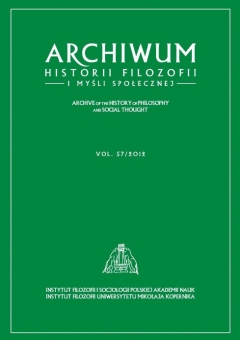Jakim Kant był psychologiem?
What Kind of Psychologist Was Kant?
Author(s): Justyna NowotniakSubject(s): Anthropology, Philosophy, Psychology
Published by: Instytut Filozofii i Socjologii Polskiej Akademii Nauk
Keywords: Kant; psychology; inner sense; paranormal psychic phenomena; mental illnesses; psychic appearances; self-observation; anthropology;
Summary/Abstract: The starting point of the discussion is Kant’s critical claim, no other cognition of the soul is possible, but on the grounds of experience. (1) The main limitation of empirical psychology in Kant’s view is, it can only describe the inner appearances, being unable to explain them. It includes no apodictic laws or principles. (2) On the other hand, we can in Kant’s opinion explain the psychic phenomena, assuming they are physically determined. The philosopher approaches in this way especially paranormal psychic phenomena and mental illnesses. In this naturalistic approach Kant is governed by the practical intention, to help people suffering from paranormal or abnormal mental states. (3) Nevertheless he takes into account also the psychological conditions of psychic appearances, endowing man with the ability to shape his soul with his mental forces. In both approaches Kant is governed in author’s view mainly by pragmatic grounds. One can take advantage of the inner experience in shaping his psyche, improving his mental capacities. One can also theoretically profit from it in philosophical reflection. But self-observing alone leads one easily astray. (4) Finally, the author reflects upon Kant’s critical theory of mind as psychology, recalling philosopher’s remarks about immanent psychology. In author’s view the critical theory of mind qua immanent psychology is embedded both in rational (a priori) and empirical cognition of the soul, aiming at dividing one from another.
Journal: Archiwum Historii Filozofii i Myśli Społecznej
- Issue Year: 2012
- Issue No: 57
- Page Range: 123-156
- Page Count: 34
- Language: Polish

